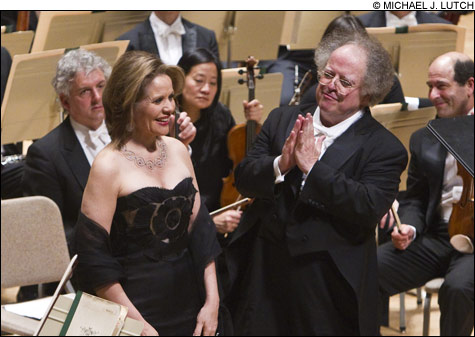
PARADISE REGAINED? Renée Fleming’s performance of Richard Strauss’s Four Last Songs might have echoed in your dreams. |
Many concerts are very good, some are great, and the rare few are a privilege to be present at. In that last category was an extraordinary program assembled by James Levine with the Boston Symphony Orchestra — a kind of divine comedy, beginning with the Inferno of Berg's dense and difficult Three Pieces for Orchestra, moving upward to Richard Strauss's yearning farewell to the earth in his Four Last Songs (1948 — its title was appended after his death in 1949), and in Mahler's Symphony No. 4 finally entering Paradise. The BSO sounded radiant, and in the Strauss and Mahler, so also did our great American diva, soprano Renée Fleming. I returned two nights later just to convince myself this concert was as ravishing as I'd thought. It was.
Berg began the Three Pieces before the assassination of Archduke Ferdinand and completed them during the war. (They didn't get to the USA till 1952.) Berg's largest orchestra can sound like a massive onslaught, but Levine not only gripped me with Berg's ineluctable structure, he also clarified the intertwining lines and melodies of Berg's polyphony. The Präludium moved from ominous rumbling through Armageddon and back to the dissolution of a dying world. In the Reigen (Round Dance), one could hear waltzes and country dances, a grim and sardonic amalgamation of 3/4-time rhythms. And in the final sinister, percussive March, the inexorability of war was slowed down by a momentary oasis of reminiscences of earlier movements, before the final cataclysm. The performance was both stunning and surprisingly seductive.
Then we moved into the world of Strauss's nostalgia: songs of lasting love and autumnal resignation sung and played with quiet intimacy and unforced lyric outpouring. Fleming can handle Strauss's highest-arching phrases without pushing her voice — that glorious tone just flows out of her. And without exactly "acting," she sings every word with conviction. In the third song, "Beim Schlafengehen" (Hermann Hesse's poem "On Going to Sleep"), a gorgeous violin solo anticipates the soprano's ascending line about the soul soaring free. Later that night, Malcolm Lowe's violin and Fleming's voice kept echoing in my dreams.
Levine's Mahler Fourth was an effortless, mercurial, unsentimental yet caressing monologue — a life story full of incident and characters. Levine has a wonderful sense of rubato, as in the extended pause he took just before the short, brilliant coda of the first movement. The Adagio's series of sublime variations also had real variety. Hushed playing is now one of the wonders of the orchestra. That sudden uncanny harmony near the end of this slow movement felt as if the pearly gates were swinging open. Welcome to Paradise.
Fleming returned in a strapless black Angel Sanchez gown. (It's credited in her bio; for the Strauss she wore emerald green.) In the two performances I heard (but not, I gather, in the one on Friday), she was on stage for the entire symphony, listening in rapt silence through three long movements before she stepped forward to sing Mahler's deliciously wide-eyed folk song about life in Heaven (who's hunting, who's cooking, who's singing and dancing, who's laughing). She combined childlike innocence with knowing awareness. At the end, receiving a standing ovation, she couldn't stop applauding the orchestra. I couldn't either.